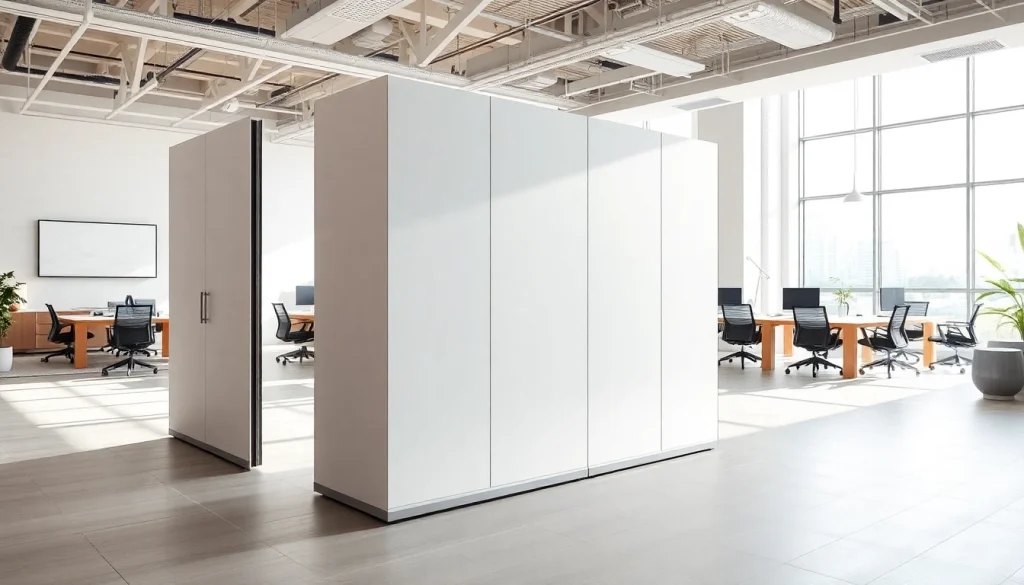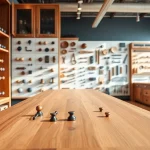Understanding Folding Partition Walls
What Are Folding Partition Walls?
Folding partition walls are innovative solutions designed to create flexible spaces by dividing large areas into smaller, more manageable sections. These partitions can be opened or closed effortlessly, allowing spaces to be reconfigured for different purposes or activities. Typically constructed using lightweight materials such as aluminum or wood, they can vary in thickness and acoustic performance. The primary purpose of a folding partition wall is to provide privacy, reduce noise, and enhance the usability of a space. Folding Partition Wall systems can be used in a variety of settings, including offices, schools, and event venues, where adaptability is key to optimizing workflows and user experiences.
Benefits of Folding Partition Walls
The advantages of installing folding partition walls are numerous, making them a popular choice for many businesses and organizations. Here are some of the primary benefits:
- Space Optimization: Folding partition walls allow for easy reconfiguration of space, enabling users to customize layouts according to their current needs without the extensive costs associated with permanent alterations.
- Acoustic Control: Many folding partitions are designed with soundproofing materials designed to minimize noise transfer between rooms, thereby enhancing privacy and productivity in environments like offices and conference centers.
- Cost-Effectiveness: Compared to traditional construction, folding partitions often represent a more economical solution for space division, requiring less investment in materials and labor while still offering high functionality.
- Quick Installation: Folding partitions can generally be installed more quickly than fixed walls, minimizing disruption and allowing spaces to become operational sooner.
- Aesthetic Variety: Available in different materials, colors, and designs, folding partitions provide aesthetic flexibility, enabling users to align their space design with branding and style preferences.
Common Applications for Folding Partition Walls
Folding partition walls find application in a diverse range of environments. Here are some of the most common uses:
- Office Spaces: In modern workplaces, folding partitions can create private meeting rooms or collaborative spaces, adapting to the changing dynamics of work.
- Educational Institutions: Schools and universities often utilize folding partitions in classrooms or auditoriums to facilitate events, thus allowing them to quickly switch between various activities.
- Event Management: Trade shows, conferences, and exhibitions use folding partition walls to define exhibitor spaces, allowing for effective crowd management and flexibility during setup.
- Hospitality: Hotels and convention centers use folding walls in banquet halls or conference rooms to offer configurable layouts suitable for different events, enhancing the guest experience.
Choosing the Right Folding Partition Wall
Factors to Consider Before Purchase
Selecting the right folding partition wall involves careful evaluation of various factors. Key considerations include:
- Usage: Determine how often the partition will be used and in what settings. Frequent use may require more durable materials and more robust mechanisms.
- Size: Take accurate measurements of the space to ensure that the partition fits properly and meets the intended functional requirements.
- Acoustic Performance: Depending on the environment, pay attention to sound-proofing ratings, particularly for offices and conference rooms where privacy is essential.
- Design and Aesthetics: Choose a design that complements overall architectural and interior design themes, enhancing ambiance without compromising functionality.
Materials and Designs Available
Folding partition walls are available in a variety of materials and designs to suit different requirements:
- Wood: Offers a classic look and can blend seamlessly with traditional interiors. It comes in various finishes and can also provide decent acoustic insulation.
- Glass: Ideal for modern settings, glass folding walls allow natural light to flow through while still providing division. Many options come with acoustic glass for added privacy.
- Fabric: Often used in less formal settings, fabric partitions offer lightweight options that are portable and customizable in terms of color and pattern.
- Metal: Aluminum or steel partitions are known for their durability and industrial aesthetic, suitable for spaces needing high strength and resilience.
Cost vs. Performance Analysis
When assessing the cost versus performance of folding partition walls, it’s essential to look beyond just the initial purchase price. Factors to consider include:
- Installation Costs: Professional installation may add to initial expenses, but a well-installed partition can enhance functionality and longevity.
- Maintenance: Consider ongoing costs associated with maintenance. Some partitions require more upkeep than others, impacting long-term expenses.
- Longevity: Investing in higher-quality materials can lead to extended lifespan and better performance, therefore saving costs in the future through avoided replacements.
Installation and Maintenance of Folding Partition Walls
DIY Installation Tips for Folding Partition Walls
Installing a folding partition might seem daunting, but with the right tools and instructions, it can be a manageable DIY project. Here are some tips:
- Read the Manual: Ensure that all components are included and familiarize yourself with the installation manual before starting.
- Gather Tools: Common tools needed include a drill, level, tape measure, and possibly a saw, depending on your design.
- Proper Alignment: Ensuring that the track or mounting hardware is level is crucial for smooth operation; make measurements systematically.
- Follow Safety Protocols: Make sure to exercise caution when operating power tools and lifting heavy panels. Enlist a friend to assist, especially on larger installations.
Professional Installation Services
While installing folding partitions can be a DIY endeavor, hiring professional services can ensure a flawless finish and optimal performance. Benefits of professional installation include:
- Expertise: Professionals are skilled in handling complex installations and may recognize potential challenges that DIYers might miss.
- Efficiency: Experience allows professionals to complete projects more quickly—helping you utilize the space sooner.
- Warranty Compliance: Many manufacturers require professional installation for warranty validation.
- Quality Assurance: Professionals ensure that the installation meets all necessary building codes and standards, guaranteeing safe and reliable operation.
Routine Maintenance for Longevity
Regular maintenance can extend the life of your folding partition walls. Consider the following practices:
- Cleaning: Regularly clean tracks and panels to remove debris and dust that may hinder operation. Use appropriate cleaning agents based on the material.
- Check for Wear: Periodically inspect hinges, wheels, and tracks for signs of wear or damage. Address issues promptly to prevent bigger problems.
- Lubrication: Lubricate moving parts as recommended by the manufacturer to ensure smooth operation.
- Alignment Checks: Ensure that the partition remains properly aligned over time, adjusting if necessary to maintain functionality.
Comparing Popular Folding Partition Wall Brands
Top Competitors in the Folding Partition Market
The following brands have established themselves as formidable players in the folding partition market, each offering unique solutions:
- Hufcor: Known for innovative designs and robust performance, Hufcor provides customizable solutions tailored to diverse commercial applications.
- Modernfold: Their range of operable partitions offers flexibility and acoustic control in various environments, backed by strong customer service.
- Kwik-Wall: Specializing in ease of use and high durability, their products often feature advanced sound control capabilities, ideal for conference settings.
- Raydoor: Raydoor focuses on aesthetics while maintaining functionality. They offer stunning designs that seamlessly fit within modern architectural frameworks.
Brand Features You Should Know
When evaluating folding partition wall brands, consider the following features:
- Customization Options: Many brands offer customizable designs, allowing you to choose sizes, colors, and finishes that match your specific needs.
- Acoustic Performance: Evaluate soundproofing ratings provided by manufacturers, ensuring the partitions meet your privacy requirements.
- Ease of Operation: Check for features like automatic opening mechanisms, which can enhance usability in commercial settings.
- Warranty and Support: Ensure the brand offers robust warranties and post-installation support for assurance over time.
User Feedback and Performance Reviews
Examining user feedback is essential for understanding real-world performance. Here are common themes gathered from user reviews:
- Ease of Use: Many customers emphasize the importance of smooth operation and ease of movement, noting that high-quality rollers and tracks greatly enhance their experience.
- Durability: Users often highlight their satisfaction with the longevity of their partitions, praising brands with robust construction methods.
- Noise Reduction: Feedback frequently revolves around the effectiveness of acoustic partitioning, especially in noisy environments where privacy is crucial.
- Aesthetic Appeal: Many reviews also note the positive impact of the partitions on the overall ambiance and functionality of spaces.
Innovations in Folding Partition Wall Technology
Smart Design Features to Look For
The evolution of folding partition wall technology has introduced many smart design elements that enhance usability and performance. Consider the following innovations:
- Automated Systems: Emerging technology allows for remote-controlled or automated opening and closing of partitions, making them even more user-friendly for large spaces.
- Integration with Smart Building Systems: Advances in smart technology allow partition systems to integrate with overall building management, providing extended functionality.
- Advanced Soundproofing Materials: New acoustic technologies ensure partitions not only divide spaces but also provide superior sound blocking capabilities, suitable for high-traffic areas.
Future Trends in Space Division Solutions
As workplace dynamics continue to evolve, the future of folding partition wall technology looks promising. Anticipated trends include:
- Sustainability: An increasing emphasis on sustainable materials and construction methods as businesses seek eco-friendly solutions.
- Modular Designs: Enhanced modular systems that provide users with even more flexibility in how they can redefine layouts for their needs.
- Smart Integration: Enhanced features allowing integration with smart office technologies, controlling lighting and temperature alongside space division.
How Folding Partition Walls Drive Efficiency in Workspaces
Implementing folding partition walls in workspaces can greatly enhance operational efficiency. Here’s how:
- Adaptive Spaces: Spaces can be adjusted quickly to accommodate meetings, teamwork, or individual projects, improving workflow.
- Resource Optimization: Organizations can maximize their space usage, ensuring they are only using the real estate required at any given time.
- Employee Satisfaction: Providing varied work environments can improve morale and productivity, as employees can choose areas best suited to their tasks.



